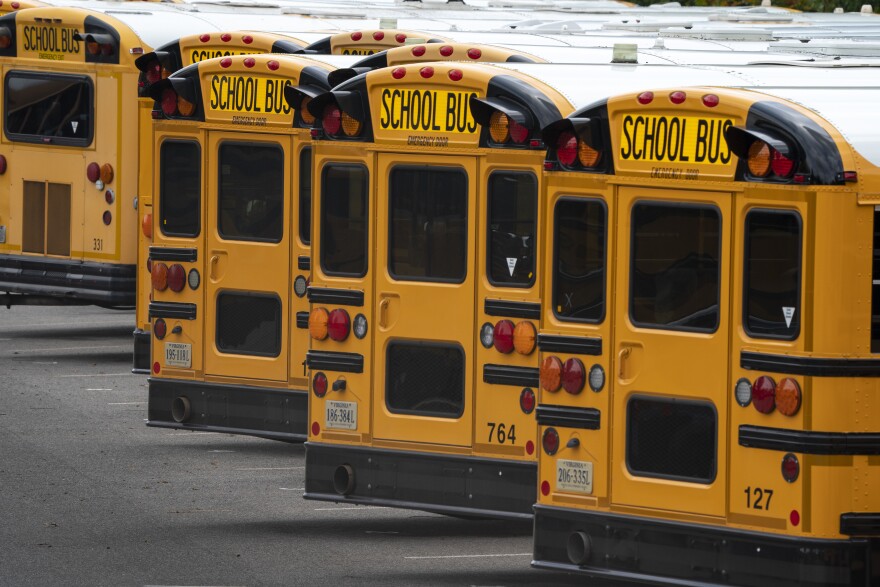BETHLEHEM, Pa. — Lehigh Valley school districts, charter schools and other educational agencies could soon be eligible for millions in federal funding to buy electric school buses.
Flora Cardoni with PennEnvironment, which is part of the Public Interest Network and advocates for a cleaner climate, hosted a webinar Tuesday to spread awareness about the grant opportunity.
- The EPA is offering grant funding for school districts and third parties to buy electric buses
- Diesel school bus emissions contain cancer-causing agents, activists say
- Bethlehem bought two EV buses through a state grant expected to start operating early next year
“Whether it's wildfires in Canada and Maui or record-breaking temperatures and droughts around the country, it's very clear that the climate crisis is here and will only get worse without major action,” Cardoni said.
“Given that transportation pollution is the number one source of climate pollution in the country, transitioning to electric buses and lowering climate pollution is a huge opportunity for our school districts to help tackle climate change, and help us all fight for a future where our kids and future generations have a livable climate to call home.”
The federal Environmental Protection Agency plans to award about $400 million for electric school buses for this fiscal year through its Clean School Bus program. The 2021 infrastructure law created a $5 billion investment for low- and zero-emission school buses across the U.S. over the next five years.
This is the second year of providing school funding. Last year the EPA offered rebates for zero-or-low emission school buses. Bethlehem Area and Allentown school districts applied for rebate dollars last year, but were waitlisted.
This year the EPA is holding a block grant competition, with another rebate program expected later this year.
Bethlehem purchased two electric school buses out of a $1 million state grant it received last year for a pilot program. In a news release, the district said it has been working with PPL to build charging infrastructure and the buses are expected to roll out in the spring.
“We really need to be looking at this kind of air pollution that impacts kids on their way to school and on their way home every single day that they go."Vanessa Lynch of Moms Clean Air Force
Other hosts for Tuesday's webinar included Sydney Stern with the EPA; Kevin King with First Student, a transportation company used by local school districts; and Moms Clean Air Force, a nonprofit organization focused on fighting air pollution.
Vanessa Lynch of Moms Clean Air Force said diesel bus emissions contain about 40 cancer-causing toxins.
“We really need to be looking at this kind of air pollution that impacts kids on their way to school and on their way home every single day that they go,” she said. “Diesel pollution and asthma is one of the biggest parts of this conversation and kids with asthma find that diesel pollution can be an asthma trigger. And what we know about asthma is it causes inflammation and irritation of the lungs, making it difficult to breathe.”
Stern said the EPA will prioritize high-needs school districts, rural areas and tribal school districts.
She said there are two ways for applicants to qualify for the electric buses — one as a school district and the other as a third-party applicant. With school districts, Stern said the EPA was targeting large fleets. Third parties must benefit at least four school districts. Private schools are not eligible.
School districts must purchase at least 15 electric buses while third parties must buy at least 25. High-priority applicants would receive up to $395,000 for buses and charging infrastructure while those that do not meet priority criteria would get up to $250,000 for buses and charging infrastructure.
The EPA plans to notify awardees between November 2023 and January 2024.
Mark Stein, chief facilities and operations officer for the Bethlehem Area School District, said because of the pilot program, the district has the capacity for more electric buses in the future. However, when district officials looked at the grant criteria, the district did not qualify for the highest-need category and it would require buying at least 15 vehicles.
"If we were successful, and we did a great job, it's a case of where we need another $2 million to now accept this grant to get 15 more buses," he said. "So we decided in the end it wasn't worth the time and investment to do that."
The Allentown School District did not respond to a request for comment Tuesday.
Kevin King, senior principal electric vehicle consultant with First Student, said trading in diesel buses for carbon-free ones makes children safer. First Student is the company the Allentown School District contracts with for transporting students.
“My children are grown, they're not riding school buses anymore,” King said. “But when my kids were younger, my older son was a severe asthmatic and he would get off that school bus every day and he’d barely make it up the steps and we had a nebulizer treatment ready for him. I am looking back 100% convinced that riding on that diesel bus exacerbated that issue for him."
The application period for the grant competition ends on Aug. 22.


